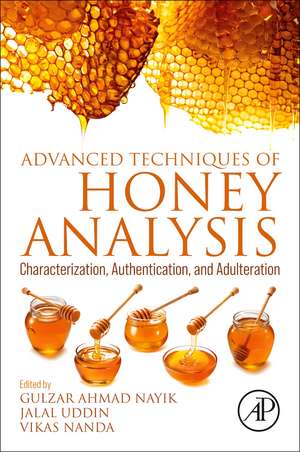Advanced Techniques of Honey Analysis: Characterization, Authentication, and Adulteration
Editat de Gulzar Ahmad Nayik, Jalal Uddin, Vikas Nandaen Limba Engleză Paperback – 24 mai 2024
Written for food scientists and those working in honey industries and related fields, this book will be a welcomed resource for all who wish to play a role in mitigating honey fraud.
- Contains comprehensive information on novel honey analytical techniques
- Discusses the characterization of determination of honey adulteration by various novel methods
- Sheds light on Nuclear magnetic resonance (NMR) spectroscopy in honey analysis
- Includes applications, literature reviews, recent developments, and methods
Preț: 671.71 lei
Preț vechi: 738.14 lei
-9% Nou
Puncte Express: 1008
Preț estimativ în valută:
128.55€ • 133.71$ • 106.12£
128.55€ • 133.71$ • 106.12£
Carte tipărită la comandă
Livrare economică 07-21 aprilie
Preluare comenzi: 021 569.72.76
Specificații
ISBN-13: 9780443131752
ISBN-10: 0443131759
Pagini: 410
Dimensiuni: 152 x 229 mm
Greutate: 0.54 kg
Editura: ELSEVIER SCIENCE
ISBN-10: 0443131759
Pagini: 410
Dimensiuni: 152 x 229 mm
Greutate: 0.54 kg
Editura: ELSEVIER SCIENCE
Cuprins
1. Honey: classification, composition, safety, Present status, quality issues and prospects
2. Botanical (Melissopalynological) and Geographical Analysis of honey
3. Honey Adulteration
4. Physiochemical, Bioactive compound and aroma profile analysis of honey
5. Microbial, thermal and Rheological analysis of honey
6. Fluorescence and Ultraviolet-Visible (UV-Vis) spectroscopy in the honey analysis
7. Infrared (IR) spectroscopy methods in honey analysis (Including FT-ATR, NIR)
8. Nuclear magnetic resonance (NMR) spectroscopy in the honey analysis
9. Raman spectroscopy methods in honey analysis
10. High-performance liquid chromatography (HPLC) and HPLC-MS/MS methods in honey analysis
11. Gas chromatography (GC) and GC-MS methods in honey analysis
12. Analysis of heavy metals as contaminants in honey
13. Stable Isotopes Methods
14. Analytical techniques to identify antibiotics and pesticides in honey
2. Botanical (Melissopalynological) and Geographical Analysis of honey
3. Honey Adulteration
4. Physiochemical, Bioactive compound and aroma profile analysis of honey
5. Microbial, thermal and Rheological analysis of honey
6. Fluorescence and Ultraviolet-Visible (UV-Vis) spectroscopy in the honey analysis
7. Infrared (IR) spectroscopy methods in honey analysis (Including FT-ATR, NIR)
8. Nuclear magnetic resonance (NMR) spectroscopy in the honey analysis
9. Raman spectroscopy methods in honey analysis
10. High-performance liquid chromatography (HPLC) and HPLC-MS/MS methods in honey analysis
11. Gas chromatography (GC) and GC-MS methods in honey analysis
12. Analysis of heavy metals as contaminants in honey
13. Stable Isotopes Methods
14. Analytical techniques to identify antibiotics and pesticides in honey
